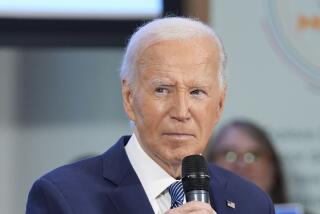Delay Decision on Missile System
- Share via
Whether to build a $26-billion system that aims to protect the United States against a limited missile attack isn’t a decision to rush into, or one to be weighed in the heat of an election contest. That’s why President Clinton’s summer target date for announcing whether he will order deployment of a National Missile Defense system needs rethinking. Sen. Joseph R. Biden Jr. (D-Del.) has joined with some of his Republican colleagues to urge that a decision be put off until a new president takes office. That prospect would be greatly aided if Texas Gov. George W. Bush, who has locked up the Republican presidential nomination, and Vice President Al Gore, his Democratic opponent, would agree to keep NMD out of the campaign.
The two most important needs in building a missile defense are to get it right and to create as few international political problems as possible in the process. NMD is a complex system of radars, sensors and missiles. President Ronald Reagan’s elaborate and costly Strategic Defense Initiative, which would have relied on space-based interceptors, was intended to provide a comprehensive shield against hundreds of attacking intercontinental missiles. NMD would defend against only a limited missile attack of the kind that a rogue state like North Korea might be able to launch some years from now.
Important questions remain about how far along NMD is technically and whether its deployment would subvert the 1972 Anti-Ballistic Missile Treaty between Washington and Moscow. Talks with the Russians about modifying the treaty are continuing. Meanwhile, Biden has agreed with former Defense Secretary William J. Perry and others that an alternative to a land-based NMD should be considered. Like Perry, he favors using the Navy’s Aegis shipboard system to track and shoot down hostile missiles as they ascend, instead of trying to intercept them as they head toward their targets.
Stationing Aegis-equipped ships off North Korea or close to such other potential missile threats as Iran and Iraq merits more attention than it has been given. Perry, knowledgeable in the nuts and bolts of defense technology, thinks it would be effective. Certainly it would be far cheaper and more quickly deployable than a land-based system.
What’s needed now is for Clinton to indicate he’s prepared to defer a decision on NMD and for the two presidential candidates to take NMD out of the campaign by agreeing to leave to the next commander in chief the crucial decision on whether to deploy and where.
More to Read
Sign up for Essential California
The most important California stories and recommendations in your inbox every morning.
You may occasionally receive promotional content from the Los Angeles Times.













